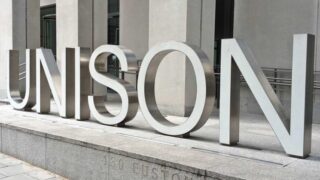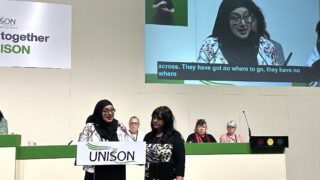“This is what our union does – we support public services and people in difficulty,” general secretary Dave Prentis declared as the union agreed to support a project aimed at helping tackle Ebola in west Africa.
The union’s national executive council heard that the project – run through the Public Services International union federation – will work with trade union partners in the countries worst affected by the Ebola outbreak: Liberia, Sierra Leone, Guinea and the Democratic Republic of Congo.
UNISON has been in the lead in getting the project under way, following on from its success working with southern African unions on the response to AIDS, and Mr Prentis was keen to point out that African unions are properly represented on the PSI steering committee overseeing the project.
It will help local unions in planning the response to the Ebola outbreak and campaigning to expand public health systems – crucial to dealing with events like the outbreak.
Mr Prentis noted that the two countries worst affected by Ebola – Sierra Leone and Liberia have just two health workers per 10,000 people. He contrasted that situation with Nigeria which has 10 times as many health workers per head of population, and where an outbreak of Ebola was successfully contained.
The project – which will cost €350,000 over two years, will employ a locally recruited organiser in each of the four countries to work with unions.
The NEC agreed to donate £50,000 from the union’s international development fund for each of the two years and agreed to ask branches if they want to contribute.
The executive also saw a moving short video from the PSI commemorating and naming the 325 health workers in the four countries who have died in responding to Ebola.
The meeting also praised the 1,000 NHS workers who have volunteered to work in west Africa, even while the UK health secretary is refusing them the pay rise recommended by their independent pay review body.
Mr Prentis also updated the NEC on the campaign against international ‘trade and investment deals’, including the TTIP between the EU and US and CETA between Europe and Canada, and the threat they posed.
“The campaign is not just about the NHS,” he said, “but to protect all public services.”
The NEC also heard that members had voted to keep the union’s key campaigning tool – UNISON’s political fund – which saw 87% vote in favour of the fund in a postal ballot.
“Our members have spoken loud and clear that they want UNISON to continue to promote their interests at European, national and local levels,” said Mr Prentis.
“This is in spite of the government’s cynical ’gagging act’ that aims to reduce the lobbying power of trade unions while the Tories happily sit back and pocket millions from corporate and financial elites.
”UNISON campaigns hard to defend jobs and decent employment standards, to promote public services and equality, and to protect the health and safety of our members, and this is possible because of the political fund.”
Following the news of the ballot result, the executive was updated on planning for the 2015 general election, and UNISON’s campaigning on the issues, in the light of the new lobbying act.
The NEC also received updates on pay campaigns across the union and formally agreed to hold a special, closed, local government conference to consider the lessons from this year’s NJC pay dispute in England, Wales and Northern Ireland and consider the best way to secure fair pay for local government workers in future.
The meeting also:
- received an update on the union’s recruitment and advertising campaign, which has seen 30% more people joining UNISON this year compared to 2013 – although overall membership figures are still under threat from the attack on public services;
- agreed the union’s objectives and priorities for 2015;
- heard a report on financial planning and budgets for 2015;
- accepted the management accounts for the first nine months of 2014;
- received a report on planning for the 2015 national delegate conference in Glasgow;
- heard an update on the union’s legal action against employment tribunal fees and heard that their impact has already seen a 91% reduction in sex discrimination cases being hear;
- sent a message of support to representatives of police staff discussing their dispute with employers in England and Wales following a ballot vote for strike action;
- sent a message of support to Barnet UNISON, in dispute over the north London council’s attack on member’s terms and conditions.



